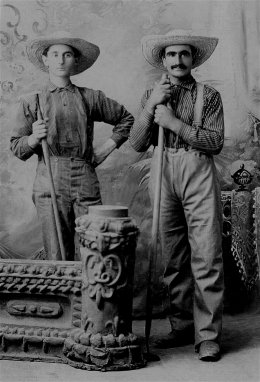
Henry with Lou Hoerman
Coming to Leonardville
My father came to the Leonardville community from Germany in April 1893. When he came to America, he did not know any language but German. This was all he needed as he left his boyhood home because his Uncle Isaac had provided for his getting aboard ship at Bremen, and there were many Germans aboard. The ocean voyage was by steamship and took between two and three weeks. Ellis Island was in use at that time, and he arrived through customs was there. There were probably others of the German passengers on the train to Chicago, but at that point he was alone taking the Rock Island for Riley, Kansas (which he pronounced Reelie). After he was on the train in the Chicago station, a trainman came to him to see his ticket, then told him he was on the wrong train. Unconvinced, Henry followed him out onto the platform but easily lost the man in the crowd and boarded the train again. What the man had in mind, Henry never found out.
Upon arrival, Henry made his home with his sister's family. This family had provided the $88 to pay my father's passage from Germany to Leonardville. The Juergen and Bertha Nanninga family lived half a mile farther west than the place where I was born. There were four Nanninga children. They lived in a 2-room frame house with a loft above (a single room not finished inside, but with rafters exposed and only sheathing and wood shingles visible.)
From the description of the house the Nanningas lived in, we get some idea of crowded housing, for Henry's coming made 7 in two rooms and the loft where all but Juergen and Bertha slept. The roof of the house was not fully weather-tight, so when it snowed with wind, snow came in to cover the sleeping children. I was in those two rooms frequently as they stood until the Merlin Potts family built their new house about 1960. The house had been extended and a second story put on to make a home for as many as 14 persons.
Schooling
Henry was 15 when he arrived and had completed the eighth grade and been confirmed in the state church in Orlach, Wuertemberg, Germany. He attended Fairview School for three months the first winter, especially to learn the use of the language, but the time was not especially fruitful because it was a one-room school with all eight grades, and the teacher, A. J. Swingle, did not seem to understand that Henry did not belong in the first grade. He worked for the Juergen Nanningas a year to repay the $88.
Work as a farm laborer
 Henry with Lou Hoerman |
Henry worked as a farm laborer for several farmers from 1894 to 1906. His first work was for a man and wife named Russell who lived 3 miles west of Leonardville where Carol and Raymond Benninga later lived. What Henry didn't like especially at Russells was that they fed him so little. He was expected to work hard and he likely had a good appetite. He began to suspect that the husband and wife got out more food after he had gone to the field. One day he forgot his work gloves in the house and returned to get them before going to the field-he found the family back at the table. He then began to eat eggs that he found in the manger in the barn. That he could eat raw eggs shows how hungry he was. One day he ate seven, he gagged and had to abandon the practice. He stayed there only one year.
Henry worked several years each for Fred Otto, Fred Uhlenhop, and Dick Meyer. He liked, and was liked, at each of these places. I remember once going with him to visit Fred Uhlenhop on a week day and once our family was there for a Sunday dinner. Fred Otto had a small son named Merton whom Henry liked very much, and that is where I got my name. Merton Otto used to give me birthday presents, and we visited him, then a retired K-State faculty member, several times after our retirement. Dick Meyer had two daughters who were children at the time Henry worked there, and I was called for the funeral of one in early retirement and at that time the other one told me that she remembered my father very kindly.
A story from the Dick Meyer period was of responsibility given him one winter to go to the Henry Meiercord home near Linn (on the Palmer side of Linn, I think) to feed out 100 head of steers that Dick Meyer owned. I heard him tell that experience several times, and I think it contributed a lot to his sense of responsibility and trust. He was responsible for grinding the corn and hauling the hay to feed them, and 100 head of cattle represented a very big investment for that time.
The Dick Meyers lived a mile and a half south of Riley and Henry rode a horse to the Evangelical Church in Leonardville. He usually spent the day with the Nanningas, the Wellers, or the Hoermans, returning after night service. .
During those years of working for these several farmers, he had no permanent place to keep his things--winter clothes in summer, etc. He had things at each of several homes, especially Wellers.
Lillian Carlson told us in 1980 that Uncle Henry had been her favorite uncle. Part of the reason was that he was at their houses more often (all of the others were married and had families), but Henry liked the children, and they liked him. He was 15 when he came to America, and then he was single 15 years more. That gave him more visiting time than most people had.
Henry kept some of his things at Weller's at times; it probably depended on where he worked. At one time he had some neckties among his things there. Lillian said they were nice ones. She and her sister Minnie like to handle them and play with them. They always tried to lay them straight so it wouldn't show, but the day Uncle Henry wanted to take his ties along, they were very afraid lest he would see that they had been played with, and would scold. They didn't ever learn whether he suspected "foul" play.
Farming for himself
1893 and 1894 were poor crop years, but there must have been some good years, at least in 1904 and 1905. Henry decided he could begin to farm for himself in 1906, and when March 1907 arrived, he figured that he was $900 ahead of where he'd been if he had continued to work for Dick Meyer. That made him think that if he could have another year like that, he could afford to marry.
Perseda Schreiber
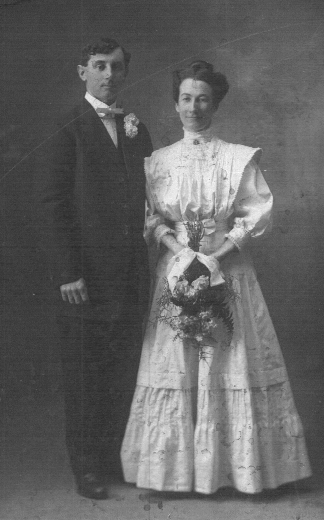 Henry and Perseda, 1908 |
When Henry began taking an interest in Perseda Schreiber, I can't say, but possibly not until he was farming for himself. I imagine that he made pretty sure that he could afford it before he thought seriously of marriage.
At the time they started keeping company, Perseda was employed, starting in 1905, as a clerk in the Sikes store -- not the stone building that still stands, but a frame building on the same location. There were many German people in the community and Mother was the only clerk fluent in German, so she was the favorite of many patrons on that account. When we were children, she told interesting incidents out of her store experience, such as when crackers came in barrels and plug tobacco had to be cut into squares of a size a man wanted to buy. Butter was purchased from housewives w2ho made it and brought it to the store to trade for items they wanted. Without refrigeration in the home or in the store, good quality butter was hard to obtain, and Mr. Sikes had his favorite (more wealthy) customers to whom certain women' butter went. One day Mr. Sikes got his nose rather close to a certain woman's butter to give it the smell test, and she was aggravated by it and pushed him on the back of the head, getting his nose into the butter. The place for butter unfit for resale was a barrel in the back room where it accumulated to be sent away for making soap.
There were times when Perseda was busy when a German patron came in, and Mr. Sikes began to wait on her; then when Perseda was free, such a customer likely left Mr. Sikes and went to Perseda to be waited on. Mr. Sikes was a proud man and found this hard to take, even though it was reasonable that language differences were sufficient to make it more comfortable to talk to one of your own people.
As Mother told it, it was traumatic when she needed to tell Mr. Sikes that she was about to be married and wouldn't be working for him any more.
Marriage
Perseda and Henry had known each other from 1895, but they didn't keep company very long before their marriage on February 20, 1908. There must have been obstacles since Perseda had two brothers at home. She could not entertain with secure privacy. The engagement took place at night along the sidewalk west of the Baptist Church in Leonardville. This was about half a block west of the Schreiber home. Their marriage took place in the Schreiber home, directly across the road south of the Evangelical Church, the Rev. C. Linge performing the ceremony. Perseda's mother had made the arrangements with him. After the ceremony, they enjoyed dinner right there and then stopped at the Nanninga home on their way to their own home.
Perseda's parents
Perseda's parents had been in the Evangelical Church ministry altogether in the German language. The Rev. J. F. Schreiber had grown up at Forreston, Ill. where he had many relatives. I know of no special education that he had in preparation for the ministry--probably just the eight grades. Iowa was new territory for the Evangelical Association, and he was sent there where his circuit covered a big territory. He had a horse and maybe a buggy but no parsonage. He stayed with people of the church groups. Maria Fisher was a young girl in such a home at Lisbon, Iowa. I think they were married before he had a place to take her, but when he was assigned to Nebraska he must have taken her along, but I believe that the oldest child (Sarah) was born at Lisbon. Very shortly after being sent to Nebraska, he was sent to Kansas in 1865.
In 1881, while serving at Swede Creek, my grandfather bought a farm near Leonardville. There was no house on the land when it was purchased, Grandpa had a small 16' x 24' house built, and, while he continued preaching elsewhere, his eldest son Gideon and his family lived in the house. Then in 1895 Grandpa retired and moved his family, including three children still at home, from Cosby, Missouri, to Leonardville. He lived in that house less than a year before he died. Perseda, her mother and two brothers continued to live on the farm until 1905, then rented out the farm and moved into Leonardville at 302 E. Barton. The house has changed only a small amount since I knew it as my grandmother's house.Grandview home
My parents' first home was in the Grandview neighborhood 3 miles east of Fairview Church, where Henry had begun farming for himself in March of 1906. The home was in the same section with the Grandview Methodist Church and only two miles from the Mill Creek Evangelical Church, but they did not consider any other than the Leonardville church. They were regularly in the Schreiber home for Sunday dinner and maybe stopped at Nanninga's on the way home.
Perseda's parents' farm opened to new renters in 1909, and Henry and Perseda moved there in March of 1909. I was born there the following November, and my sister Carol was born two years later.
Lillian Carlson reported that one bitterly cold winter day early 1910, when there was lots of snow, my parents and I went to visit the Wellers (I was only 2 or 3 months old). We went in the two-horse sled we had. I stood the trip well, although the Wellers wondered that I didn't smother for all the clothes and bedding I had around me. Lillian said that my parents reported that Henry had to stand on the high side of the sled at several places to keep the sled from tipping over. The drifts were so high and sometimes travel was alongside them, making the sled tip badly.
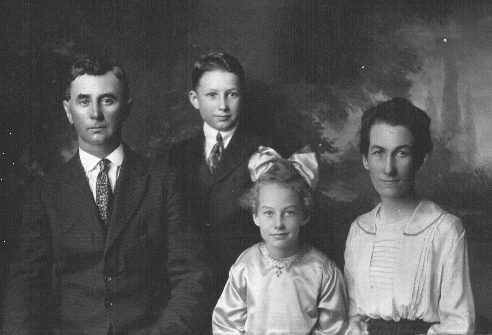 Henry, Merton, Carol, and Perseda, 1920 |
Perseda's operation
My mother was not fully well all through my childhood. In 1918 a Dr. Carlson who came to Leonardville briefly discovered that she had had chronic appendicitis from childhood, and he performed the surgery in our home in March of 1918. She had doctored with Dr. Henderson (who delivered both of us children), but he did not find her trouble. She required further surgery in 1924 and was helped to a small hospital in Lawrence by a niece, Gladys Schreiber, who was head nurse there. The doctor who owned the hospital did the diagnosing and a Kansas City surgeon did the surgery. I had my appendectomy in December 1926 in the same hospital with the same surgeon, although Gladys Schreiber Torneden had married and was no longer the head nurse there.
In those days, when you lived in Leonardville, you considered yourself rather limited to the resources of Leonardville. If the doctor there couldn't help you, that was your fate. I remember hearing my parents tell about the day they went to see Dr. Carlson. Mother was sick and they had come to town to see Dr. Henderson. But they were loath to do so; he hadn't helped before. Should they go see the new doctor? They didn't know anything about him. I'm sure they prayed a lot about it; what should they do? (Not only that day, but through months preceding.) They were in Sikes' Store and Dr. Carlson's office was across the street. They decided to go over to see him. He diagnosed her need as chronic appendicitis (Her appendix had grown long and around the small intestine.) within minutes and said he could do the surgery in our home and his charge would be $200. They often marveled afterwards that they were able to put their trust in a stranger so quickly, but they felt led to do it.
Dr. Carlson made all the arrangements--that is, he hired a nurse who was with us two weeks at $28 a week. He told the folks just how to prepare. I remember how the sheets were torn into strips and boiled in a copper boiler on the kitchen range for sterilizing, then made into pads as the doctor prescribed. The surgery was performed in the living room. My sister Carol was not yet in school, but she went along to visit that day. Dr. Carlson secured Dr. John R. Brinkley who had settled at Milford to be his assistant. The surgery went well and in due time mother was well, too--at least fairly well, though she did require further surgery 6 years later, and it was thereafter that she enjoyed the best health of her life. She had never weighed 100 pounds before. Then she lived to be 90.
Farming
My parents rented the farm until they bought it in September, 1916. Mother inherited one-sixth of the town property when it was sold after Grandma Schreiber's death in 1915, and also one sixth of the $16,000 they paid for the farm. But it was 1943 before the farm was fully paid for. They made reasonable progress from 1916 to 1930, but then the low farm prices and the dry years brought real hard times to the farm. Better crops in the late '30's and higher prices in World War II helped them pay off the loan, which had been a promissory-note loan from a farmer south of Bala -- Henry Hollen.
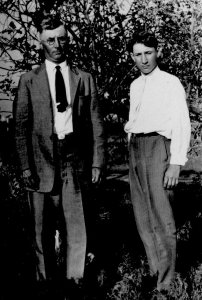 Henry and Merton, 1924 |
After I finished high school and stayed at home, we began renting additional land, first from John Johnsmeyer who lived a mile north of us and wished to cut back on his work, and second, from Oliver Nelson the farm a mile north of the corner east of Leonardville, which an elderly spinster, Lottie Salstrom, owned and had difficulty renting because she had difficulty with renters. Oliver was a relative and took on sort of a guardian relationship. We farmed it three years, in times of poor crops and low prices; then, Oliver bought the place and moved onto it. The Johnsmeyer farm was sold to the son-in-law and other rental arrangements were made. Thus, as I went on to college, the expanded farming operation gradually took care of itself.
It was in the summer of 1930 that I confessed to my parents that I was called to be a minister. They were supportive and helped me in many ways prepare for college at LeMars, Iowa. I was at home for summers on the farm through 1935. On May 12, 1937 I married Ina Hubbard, a college friend.
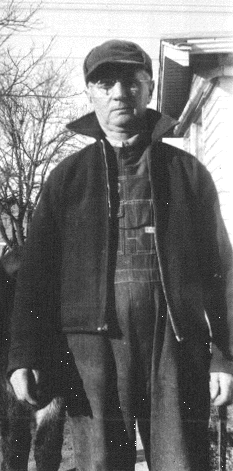 Henry, 1938 |
The nest emptied completely when my sister Carol married Raymond Benninga in June of 1938. While my father no longer had a son to help with the farm work, he had a son-in-law. That is how he got along without ever buying a tractor or farm equipment for it. Raymond had a tractor, while my father had farmed only with horses and never to make the switch to a tractor. Corn husking and other work was hired by the job or by the day.
My father was taking on the terracing of his farm and the beginning of contour farming. There were good government payments for this. As needed, he hired Raymond to do some of the work; later he rented part of the land to Raymond; finally all of it. While still farming, he was working himself out of it.
Social Security was coming in, and Daddy and Mother saw its importance to them. The minimum requirement was to farm six quarters of a year and pay a Social Security tax on the income. The minimum Social Security payment that this brought was small by today's standards, and then after Daddy's death, Mother received only two-thirds, but from 1958 to 1969 there was never less than $52 in the monthly check, and there were burial payments. It helped; and the plan was opened to farmers only in the "nick of time" as far as my parents were concerned.
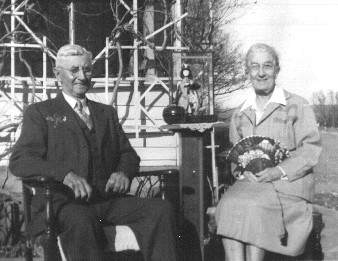 Henry and Perseda, 1955 |
Old Age
My father had been very ill in the spring of 1957, and had a high fever. Mother did not think he'd come back from the hospital alive. Modern medicines brought him through physically, but it was soon evident that he was not his full self any more mentally. The decision to move to town came the following year.
Daddy and Mother decided not to employ help in making selling the farm; they could do that themselves and save the fee. They sold the farm to Donald Lund for $24,000, a nice profit, they thought. True, but a realtor would have realized better how property values were rising. They should have had more. They sold livestock, grain, and a few implements without a big auction, and then gave away small items to a variety of friends. The costs of a public auction would likely have taken up most of what so small a sale would have brought in. Raymond took a few items; I took a few tools; some items were just left for the new buyer to use or throw away.
Henry's Decline
They paid $9,000 for the little house at 303 E. Chase in Leonardville, a house made from the old Monitor school building. We hoped it would be a comfortable home for them, across the street from the church, but that didn't work out. Daddy was too ill for that. Was it Alzheimer's that was at least part of his trouble? That diagnosis was seldom given in our locality in 1958, but he had several of those characteristics that made him very difficult to manage.
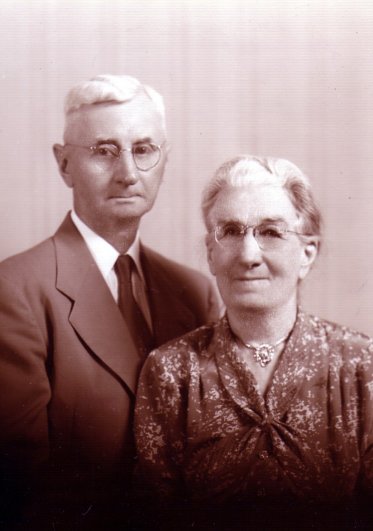 Henry and Perseda, 1958, 50th anniversary |
Life in town was not pleasant. Daddy was too confused to ever recognize the new place as home and had to be restrained. Mother had been the submissive one through the years, the one in poorer health; now she had to become the assertive one, taking over the business management as well as being the home disciplinarian. Her granddaughter Norma Benninga provided some help, and, of course, without Carol living only three miles away, my mother could not have managed. Fortunately, Daddy's decline was fairly rapid. In October of 1960, we took him to the Jolly Nursing Home in Manhattan. He couldn't stay there because he'd walk away. Then we located a nursing home in Junction City that had a fence around it. He lived there until his death, January 23, 1961.
Perseda Alone
Mother had very little will to live after Daddy was gone. We thought that with the relief of responsibility for him, she'd "bounce back", but she never did. She very much wanted to die right away. While we lived at Jewell, she was with us during the school year, starting 1961-62, and with Carol in the summer.
After Mother had lived with us a year at Huscher, 1965-1966, she lived a year and a half in Goldie Martin's rest home in Concordia. When the Leonardville Nursing Home opened up, she was the first patient to move in, and was happy there for the next year and a half. My last visit with her was up to 5 pm on the day she died, January 14, 1969. She was able to visit freely, but we knew she was declining fast. At 8pm we got a call that she was gone. She had reached the age of 90 and that was considered an advanced age at the time.
A Tribute
I had very good parents. They loved me, supported me, and taught me a lot of important values. They were consistent in leading worship in the home and in church. They were faithful supporters of the church, too, in prayer, in attendance, and in finances. I continue to be thankful for my parents.
Merton Zeisset
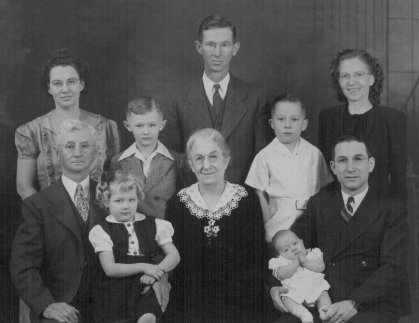 Henry and descendants, 1947 |
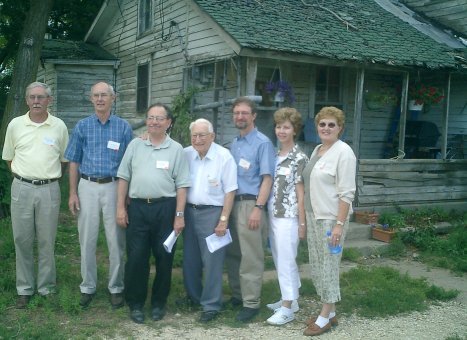 Henry's son and grandchildren, 2004, at farm home |